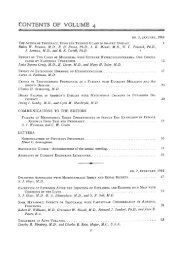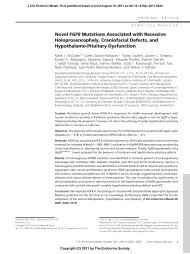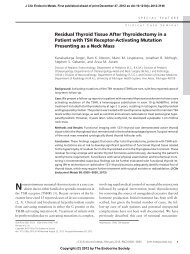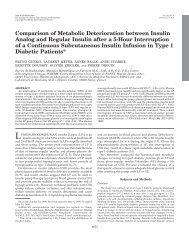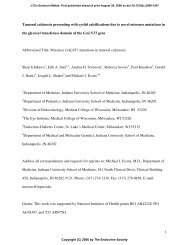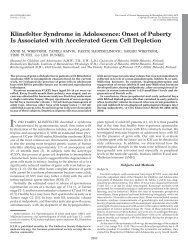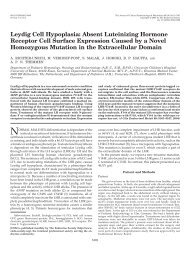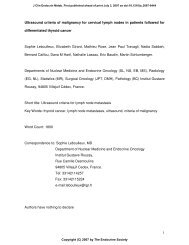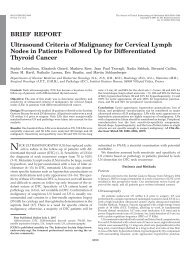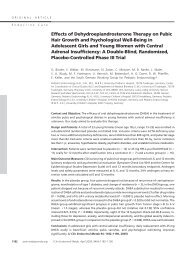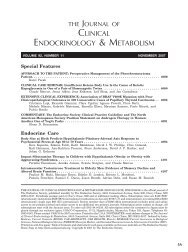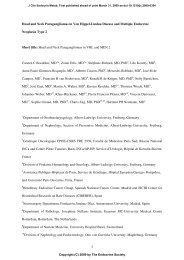Impaired glucose-induced glucagon suppression after partial ...
Impaired glucose-induced glucagon suppression after partial ...
Impaired glucose-induced glucagon suppression after partial ...
Create successful ePaper yourself
Turn your PDF publications into a flip-book with our unique Google optimized e-Paper software.
cell secretion (34, 35). Consistent with such reasoning, previous studies in baboons and<br />
minipigs have demonstrated a close inverse relationship between circulating insulin and<br />
<strong>glucagon</strong> levels at a minute-by-minute basis (16, 17). Furthermore, selective destruction of<br />
islet beta-cells in Göttingen minipigs has resulted in a loss of meal-<strong>induced</strong> <strong>glucagon</strong><br />
<strong>suppression</strong> and the development of overt hyperglycaemia (17). The present findings extend<br />
these studies by showing that an inverse relationship between insulin and <strong>glucagon</strong> levels can<br />
also be found at a systemic level, independent of the paracrine interaction of both hormones<br />
within the individual islets. Thus, since the intra-islet relationship between alpha- and beta-<br />
cells should not be affected by a hemi-pancreatectomy, the loss of <strong>glucose</strong>-<strong>induced</strong><br />
<strong>suppression</strong> of <strong>glucagon</strong> levels in the present experiments suggests that a general reduction in<br />
systemic insulin levels may impair alpha-cell function as well. Of note, this effect was<br />
apparent <strong>after</strong> both pancreatic head and tail resection. Such argumentation is also consistent<br />
with previous studied by Robertson and colleagues showing elevated post-operative fasting<br />
<strong>glucagon</strong> levels in healthy subjects who donated 50% of their pancreas for transplantation<br />
(36). Taken together, these studies emphasize the importance of circulating insulin levels for<br />
the maintenance of alpha-cell function and lend strong support to the postulate that the<br />
hyper<strong>glucagon</strong>aemia in patients with type 2 diabetes develops as a consequence of the<br />
reduction in beta-cell mass, rather than due to an independent, primary defect in alpha-cell<br />
function. Such reasoning is also in line with the clinical finding that endogenous <strong>glucagon</strong><br />
levels often decline <strong>after</strong> exogenous insulin supplementation in patients with diabetes (37,<br />
38). However, aside from these effects of systemic insulin, a direct paracrine interaction<br />
between insulin and alpha-cells may still exist, as suggested by previous animal studies.<br />
Arguably, the inverse relationship between beta- and alpha-cell secretion may also be<br />
mediated by other secretory products of the beta-cell than just insulin. In this regard, a direct<br />
inhibitory action of zinc on alpha-cell secretion has recently been postulated by some (39),<br />
but not all groups (40). However, while such inhibitory actions of zinc may contribute to the<br />
11



